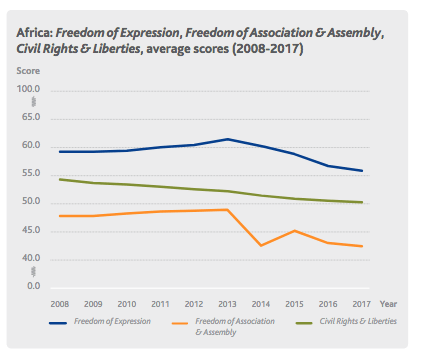No-one who has looked at Africa since its freedom decade in the 1960’s can be anything but worried about what they see.
I am not talking about murderous regimes like Rwanda, rigged elections like Zimbabwe’s or countries like Eritrea in which human rights have next to no hold. Nor am I looking at countries like Mali, Cameroon or South Sudan which are being torn apart by conflict.
Africa’s social media threat
One of the most worrying issues is the use of social media to manipulate Africa’s citizens – and its dynamic, young population in particular.
Excellent articles have been published warning of this: here are some of them.
This is the conclusion of one article on South Africa.
South Africans need to be extremely vigilant in the upcoming 2019 general elections which are fast approaching. We’ve already seen how local actors such as the Guptabots have effectively changed our national conversations. There’s no reason to believe that this won’t continue to happen in the next election, as it has around the world.
The article covers a range of events – from the election of Ramaphosa and the Colonialism tweet by Helen Zille to the fears of the white right over farm murders. The article needs reading in full, but all the events resulted in attacks by fake accounts and bad actors. The author identifies three types of ‘bad actors’ that often get conflated in discussions of propaganda and disinformation on social media: bots, sockpuppets and trolls.
Not just an African problem
A study, based at Oxford University, has been working hard to uncover what’s going on.
It is the Computational Propaganda Project.
This is their overall conclusion.
“In 2017, the first Global Cyber Troops inventory shed light on the global organization of social media manipulation by government and political party actors. This 2018 report analyses the new trends of organized media manipulation, and the growing capacities, strategies and resources that support this phenomenon. Our key findings are:
- We have found evidence of formally organized social media manipulation campaigns in 48 countries, up from 28 countries last year. In each country there is at least one political party or government agency using social media to manipulate public opinion domestically.
- Much of this growth comes from countries where political parties are spreading disinformation during elections, or countries where government agencies feel threatened by junk news and foreign interference and are responding by developing their own computational propaganda campaigns in response.
- In a fifth of these 48 countries—mostly across the Global South—we found evidence of disinformation campaigns operating over chat applications such as WhatsApp, Telegram and WeChat.
- Computational propaganda still involves social media account automation and online commentary teams, but is making increasing use of paid advertisements and search engine optimization on a widening array of Internet platforms.
Social media manipulation is big business. Since 2010, political parties and governments have spent more than half a billion dollars on the research, development, and implementation of psychological operations and public opinion manipulation over social media. In a few countries this includes efforts to counter extremism, but in most countries this involves the spread junk news and misinformation during elections, military crises, and complex humanitarian disasters.”
Conclusion
We are all under threat, but Africa – which faces additional problems of conflict, gross corruption and a youth population profile – seems particularly vulnerable.
 Africa’s fundamental rights are already under attack. Freedom is being eroded.
Africa’s fundamental rights are already under attack. Freedom is being eroded.
This trend has been picked up by the Mo Ibrahim Foundation, which today published its 2018 index.
As it states: “Almost 70.0% of Africa’s citizens live in a country where civil rights and liberties have been curtailed in the past decade, and more than 30.0% live in a country where this deterioration has become worse over the last five years.”
Where basic rights are already under attack, social media are the new battlefield in the fight for freedom.
In these circumstances, African democracies are threatened by orchestrated social media attacks. Our mobile phones and laptops may now be as dangerous as the riot policeman, political thug or torturer. Our precious rights are being manipulated, undermined and distorted – without a blow being struck.
